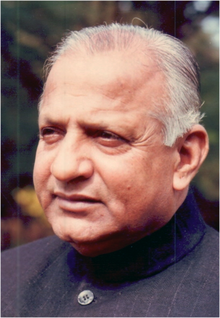- D. Devaraj Urs
-
D. Devaraj Urs ( Kannada : ಡಿ.ದೇವರಾಜ ಅರಸ ) (1915 -1982) dominated Karnataka politics for many years and was twice Chief Minister of the state. Originally from Mysore, he was a member of what came to be known as the 'Syndicate' of powerful regional leaders, though he never went as far as, for example, Kamaraj, in opposition to Indira Gandhi. He is particularly remembered for his reforms that targeted the scheduled castes and the OBCs of Karnataka, and for his constant pipe-smoking.
Urs had practically retired from politics when the first Congress split took place in 1969, and the Syndicate formed the Congress (O) while Mrs. Gandhi formed the Congress (I). The Congress (O), under S. Nijalingappa, Veerendra Patil, Ramakrishna Hegde and Deve Gowda dominated Karnataka electorally and had a majority in the state assembly, but Urs declined the invitation to join it. Instead, he agreed to lead the Congress (I) in the state and successfully won the state for Mrs. Gandhi in 1971.
In response to Mrs. Gandhi's declaration that poverty was her first priority (Garibi Hatao) and her Twenty-Point Programme, he formed a state Cabinet dominated by technocrats and academics. His first priority was land reform, and his slogan was "land to the tiller"; under him a sustained effort was made to equalize the land distribution through much of the state. Karnataka, thus, other than the Communist bastions of Kerala and West Bengal, has had one of the most successful land redistributions in the country. A side effect of this was to break the power of the Lingayats and Vokkaligas, the previously dominant castes, over local politics. He was helped in his endeavours by his son-in-law Dr M. D. Nataraj.
Other schemes included the building of shelters for migrant workers; the forgiveness of rural debt; and, in a populist masterstroke, a plan to have an electric bulb in every house. When R. K. Baliga, Founder of the Electronics City proposed the concept of developing the electronic city in the early 1970s it was met with skepticism but Devaraj Urs supported him and approved the project. This initial seed investment by the Karnataka State Government in 1976 laid the foundation for the Electronics City.
In 1978, however, he exited the Congress (I), which had crashed out of power. He had quarreled with Indira Gandhi, and was appearing before the Supreme Court in Karnataka vs. Union of India, and thus felt the time was right to cut his losses and leave the Congress. This was a miscalculation; although many legislators in Karnataka, Kerala and Goa went with him - such as A.K. Antony, Sharad Pawar, Priyaranjan Das Munshi and K.P. Unnikrishnan. Mrs. Gandhi swept back to power at the national level and the fledgling Congress (Urs) was routed. Urs subsequently joined the Janata Party, and his protege Ramakrishna Hegde recaptured power in Karnataka from the Congress in 1984. The Congress (Urs) itself became Congress (S) in 1983.
Dates in power
During the Fifth Assembly of Karnataka State, D. Devaraj Urs was the Chief Minister from 20-03-1972 to 31-12-1977. President's rule was imposed from 31-12-1977 to 28-02-1978, following Mrs. Gandhi's fall. The Sixth Assembly lasted its five-year term, from 17 March 1978 to 8 June 1983. Devraj Urs was Chief Minister from 28-02-1978 to 07-01-1980, when he was succeeded by R. Gundu Rao.
Accomplishments
D. Devaraj Urs espoused the cause poor and ushered in a "silent social revolution" in the state of Karnataka. He was the voice of the poor and stood for the cause of the downtrodden in society.
That Urs was elected continuously from Hunsur as an MLA for 28 years, from 1952 to 1980, spoke of volumes of his popularity. He was one of the longest serving Chief Ministers of the State.
Among the contributions of the late Chief Minister was the stress laid on the education of the people belonging to the backward classes and establishment of the backwards and minorities hostels for the students hailing from those sections of society.
Absorbing 16,000 unemployed graduates in the stipendiary scheme whose services were confirmed later, abolition of carrying night soil by Dalits and bonded labour, renaming of Mysore as Karnataka in 1973 were some landmark decisions taken by him.
D. Devaraj Urs was one of the greatest social reformers the State had seen. The land reforms spearheaded by him, in which the tiller of the land became the owner, was exemplary. It had reduced the chasm between the rich and the poor, doing away with social inequality.
Mysore district had the highest incidents of bonded labour in India during that time and the decision of the Urs Government to abolish it was remarkable. Urs must be remembered for his achievements in weaning away poor people from the clutches of the rich moneylenders. The deeds of the late Chief Minister in the irrigation sector too had helped the farmer community tremendously. The Kali project, one of them, was executed amidst opposition from several quarters.
External links
Chief ministers of Karnataka K. C. Reddy • Kengal Hanumanthaiah • Kadidal Manjappa • S. Nijalingappa • B. D. Jatti • S. R. Kanthi • Veerendra Patil • D. Devaraj Urs • R. Gundu Rao • Ramakrishna Hegde • S. R. Bommai • S. Bangarappa • M. Veerappa Moily • H. D. Deve Gowda • J. H. Patel • S. M. Krishna • Dharam Singh • H. D. Kumaraswamy • B. S. Yeddyurappa • D. V. Sadananda GowdaCategories:- Chief Ministers of Karnataka
- 1915 births
- 1982 deaths
- People from Mysore
Wikimedia Foundation. 2010.



